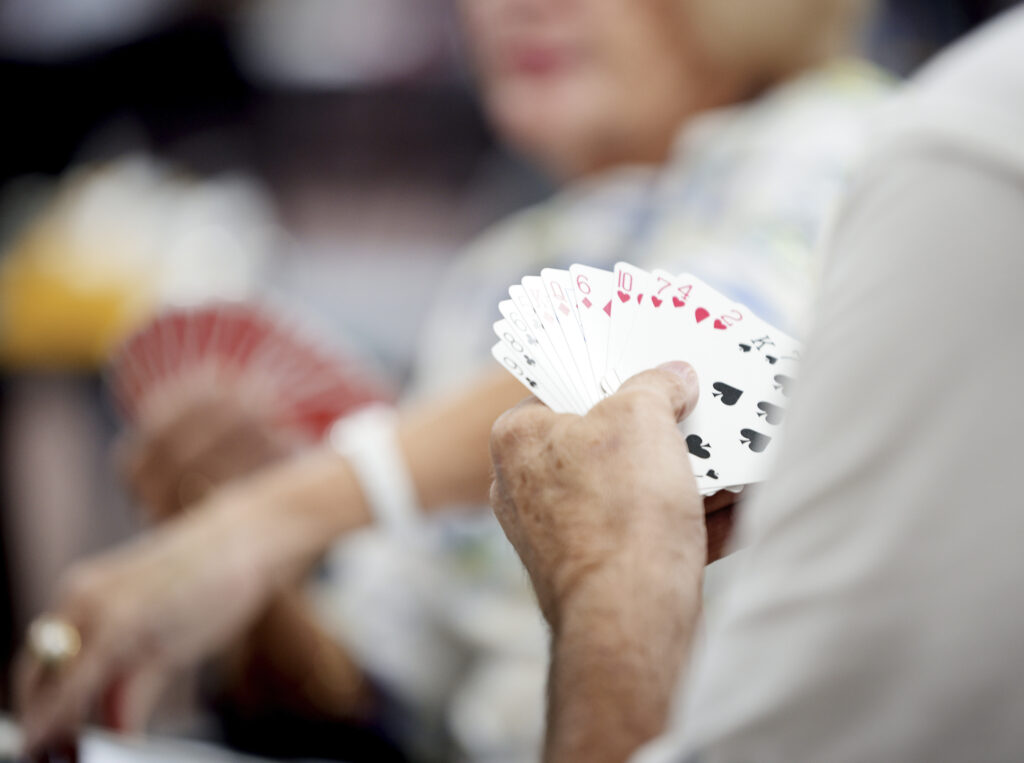When the North Vero Beach/Sebastian Bridge Club ended its duplicate game last Friday and closed its doors for good, it was the second time in about six months that a local so-called “open” bridge club ceased operations.
The closure leaves the Vero Beach Bridge Center on 14th Avenue on the edge of downtown, across the street from the Crestlawn Cemetery, as the only place remaining in the county where anyone can drop in and play competitive bridge.
Bridge, however, is still far from dead in Vero Beach, which for years has been known as an avid bridge-playing community where many people chose to retire specifically for the quality of competitive bridge offered in multiple locations.
But the game is now mostly played behind the barriers of country clubs and gated communities.
Invitational games are offered – usually once a week, sometimes more often – at Riomar, The Moorings, Quail Valley, Sea Oaks, Windsor, Orchid, the Vero Beach Country Club, John’s Island, The Vero Beach Yacht Club, Bent Pine, Grand Harbor, Oak Harbor and the Indian River Estates retirement community out west along State Route 60.
For some – but not all – of these games, the Vero Beach Bridge Center provides the directors and infrastructure to run them and charges the private clubs for that service.
In season, the 12 private clubs also run a Treasure Coast Interclub League on Saturdays, taking turns hosting scrumptious lunches for the players. That league is now also run by a VBBC director.
The biggest of these invitation-only contests is the Tuesday afternoon game at Oak Harbor, which in season often sells out with all available 20 tables occupied. Even on that front, however, a challenge looms. The Oak Harbor game is now looking for a new ACBL-accredited director because the current director, Joyce Leach, who is well into her 80s and had significant health problems last year, has announced she will retire in April.
Bridge was hit hard by the Covid pandemic, which shut down face-to-face bridge for more than a year as of early 2020 across the country. By the time bridge clubs started reopening, some of the aging bridge population had died off (not necessarily of Covid), and in the interim, no new classes could be given to recruit new players. Others moved their bridge game online and started playing on the computer, triggering numerous cheating scandals, and still others simply quit bridge and found other things to do with their time.
The twice-weekly in-person game at the Vero Beach Community Center was the first to give up last year, in its 26th year of operations. Attendance had declined somewhat since Covid, but longtime club manager and director Norman Hinds could not continue for health reasons and was unable to find a successor to take over the club.
Last week, Jim Schorner had to follow suit in club closures with the recently relocated Sebastian Club that had been moved to the Polish-American Club on U.S. 1 and renamed North Vero/Sebastian Club. Attendance never picked up, even during the supposedly busy wintertime, and with tax preparation season coming up (Schorner is a semi-retired tax attorney and CPA still attending to many Vero Beach clients), Schorner also gave up the struggle when he couldn’t find a buyer or successor. (Schorner still runs the Saturday invitational game at Indian River Estates where he and wife Judy live.)
Officially, the demise of the North Vero/Sebastian club is being styled as a “merger” with the Vero Beach Bridge Center, and Sebastian players who had already paid for a yearly membership there don’t have to pay new 2025 membership fees at Vero. Schorner asked his players to show up as a block this past Monday at the Vero Beach Bridge Club and said they would be given a special section of tables.
The Vero Beach Bridge Center, the one remaining open club, is keeping its head above water, in large part with continuing donations from wealthy members whose names are published every month in effort to induce even more giving by others. Attendance is down significantly from pre-Covid levels, as it is at bridge clubs across the country, and in more than two years of trying, the club has been unable to sell all or part of its now-too-big member-owned building, a former bowling alley.
The 66-year-old club offers daily afternoon games, often split between sections for more and less experienced players, as well as some morning games for beginners, classes, and some weekend games in a team format. Usual card fees are $10 per person for members (an annual membership costs $50) and $12 for non-members.
The bridge club at present is in the middle of its annual member retention campaign, trying to get most of the 700-odd members on the books to renew. In the pre-Covid days, the Vero Beach Bridge Club had more than 1,100 members and was once the fourth largest bridge club in the country by table count.
In one of his latest messages to the membership, Vero Beach Bridge Club Board President Denis Conlon acknowledged that many local bridge players apparently prefer to play at their country clubs and gated communities, but urged them to support the open bridge club anyway by remaining or becoming members.
“Even if you mostly play at one of the many local private clubs,” Conlon said in an email letter, “your membership benefits many of these games, either directly via administration or by providing back-up when needed.”

